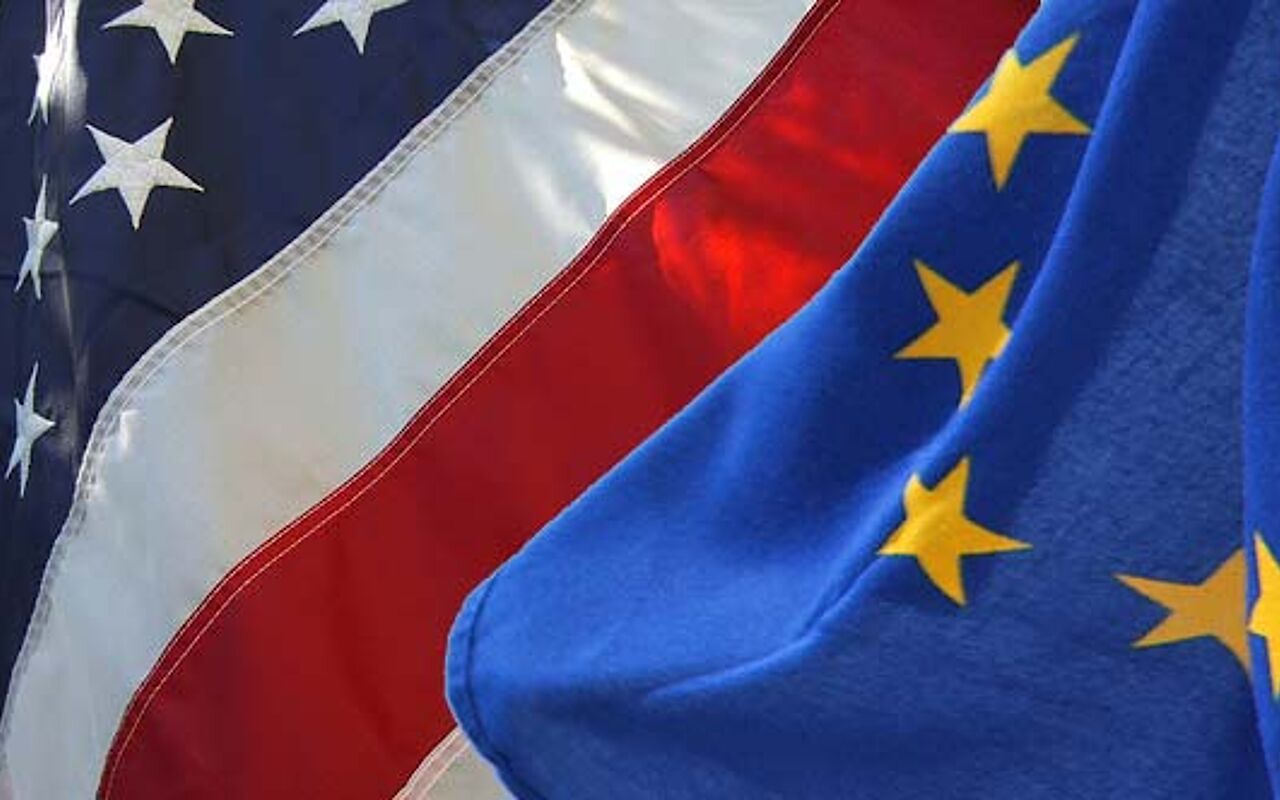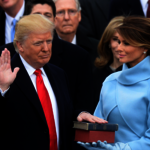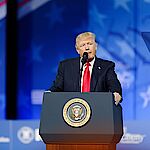Transatlantic Relations in the 2016 Elections
The Atlantic Academy’s Road to the Elections No. 9
Florian Böller, Technical University Kaiserslautern
About this Series
On November 8, nearly 200 Million registered voters are called upon to elect the next President of the United States of America, all 435 members of the House of Representatives as well as thirty-four of the one hundred senators. As in 2008, there is no incumbent, which is why both parties, the Democrats and the Republicans, will determine their candidates in primary elections. Thus, maybe fundamental changes but at least new accents in some policy fields should be expected.
With a monthly publication series, the Atlantic Academy will focus on this road to the elections in November. Political and economic scientists analyze policy fields as well as their roles in the (primary) elections and formulate expectations for a new presidency and Congress.
Despite the importance of foreign policy issues in the 2016 elections―amongst them the fight against international terrorism and the strategic challenge of China in the Asia-Pacific region―transatlantic relations do not figure prominently during this year’s campaign. In Europe, especially the issue of TTIP became highly politicized while the controversy around global trade agreements focused on the Trans Pacific Partnership (TPP) in the U.S. instead. Similarly, the multilateral mission to combat the rise of ISIS has not prompted a debate on how the transatlantic community could pursue a broader political solution for Syria. Considering the transnational dimension of many current challenges such as the refugee crisis, the spread of Islamist terrorism, or the threat of failed states, this neglect seems remarkable. Still, the U.S. discourse has been dominated by a distinct national focus on how the U.S. and its regional allies in the Middle East should respond to the quagmire in Syria and whether America needs to develop a more assertive strategy in contrast to Barack Obama’s foreign policy restraint (see Gerlinde Groitl’s contribution in this series). Even the conflict in Ukraine remained under the radar of the 2016 campaign, despite ongoing skirmishes and dismal prospects for peace. Although European and transatlantic topics seemed invisible during the campaign, the election on November 8 nevertheless entails serious implications for the relationship between the U.S. and Europe. As the presidential race becomes increasingly competitive, both candidates offer a distinct policy profile for the future of transatlantic relations. While a Trump presidency would most likely deepen already visible tensions on the issue of transatlantic burden sharing, a Clinton administration promises more continuity than change. However, some structural developments would continue to render transatlantic cooperation difficult on both sides of the Atlantic.
Obama’s Transatlantic Legacy
Obama’s legacy on transatlantic relations provides a paradox. From the start, Obama underscored the importance of multilateral cooperation after the deep rift between Europe and the U.S. during the Bush administration. In the eyes of the European public, the war in Iraq, the Guantanamo detention camp, black-site prisons operated by the CIA on European soil and the torture scandals of Abu-Ghraib led to a widespread perception that the United States damaged shared values such as the respect for human rights and international law. The Obama administration acknowledged this decline of American soft power, namely its ability to convince partners in Europe to contribute to building a liberal world order, which remained the cornerstone of U.S. grand strategy. In May 2009, Obama explained, that the U.S. “went off course” and that decisions such as Guantanamo and Iraq not only served as a “recruiting tool” for terrorists but also alienated international partners (White House 2009). Obama’s policy also reflected a perception shared by a majority of the U.S. public. According to a Chicago Council on Global Affairs (CCGA) survey, “improving America’s standing in the world” figured as the most important foreign policy goal in 2008 (CCGA 2008). Indeed, Obama’s initial decisions of ordering to close Guantanamo, his diplomatic initiatives in the Middle East or the efforts to lead global non-proliferation and arms control policies received overwhelming support in European societies―despite their mostly symbolic (e.g. “Global Zero”) or failed (Middle East, Guantanamo) results. While the departure from Bush’s unilateralism was welcomed in Europe, Obama’s approach was not altruistic. His call for multilateral cooperation also aimed to reduce the costs of American leadership. Transatlantic relations presented an opportunity to pursue a more cost-efficient course in order to combat common security challenges. Already as a candidate, Obama articulated this strategy very clearly. In his famous 2008 speech in Berlin, Obama explained: “In this new century, Americans and Europeans alike will be required to do more―not less” (CNN 2008). The demand for international engagement fell on deaf ears in European capitals. Like the U.S., governments in Berlin, London, Paris and elsewhere were confronted with the economic downturn. Their inclination to contribute more to common missions remained very limited. As a consequence, numerous efforts, for example to combat the Taliban in Afghanistan, rested largely on U.S. shoulders. Europe resisted Obama’s calls for a shared leadership role and failed to reform its security institutions in order to become a capable partner. Washington regularly pointed out that NATO allies did not meet the aim to spend at least two percent of the GDP for defense purposes. The intervention in Libya in 2011 illustrates the increased tensions on burden sharing among transatlantic partners. France and Great Britain pushed to intervene in Libya while President Obama only reluctantly supported the air campaign. Soon it became apparent that European allies lacked the necessary resources to conduct the air strikes against Ghaddafi’s regime. U.S. forces had to provide armament, intelligence and logistics for its partners. The Libya intervention thus highlighted that Europe was not able to conduct operations that were supposedly in their very own interest. In a widely recognized speech in Brussels, then U.S. Secretary of Defense Robert Gates articulated the U.S. perspective on burden sharing: “The blunt reality is that there will be dwindling appetite and patience in the U.S. Congress―and in the American body politic writ large―to expend increasingly precious funds on behalf of nations that are apparently unwilling to devote the necessary resources or make the necessary changes to be serious and capable partners in their own defense.”
The example of Libya illustrates the structural rifts in the transatlantic partnership. First, it demonstrated Europe’s inability to deepen its security integration and to resolve prevailing national caveats. Second, in terms of military power, the transatlantic relationship remained heavily uneven with the U.S. spending two times more than all other NATO partners. Third, in times of fiscal austerity in Europe and the U.S., costly international engagements had been put under scrutiny. This in turn diminished the ability of transatlantic partners to invest in regional security and crisis management. Hence, the paradox of Obama’s foreign policy approach lies in its distinct multilateral outlet. While multilateralism per se was welcomed, it came with increased expectations towards Europe’s contribution to transatlantic security. These expectations were not met during the Obama administration—until 2014.
Russia’s power politics in Ukraine since 2014 have put some glue in the cracks of transatlantic relations. On the European side, the crisis led to a reorientation towards NATO’s original purpose: collective defense. Major Western European states agreed to step up NATO’s force posture on its Eastern flank―a long held wish of Poland and the Baltic States. The U.S. contributed to these efforts with a “European Reassurance Initiative,” including an increased presence of troops and military exercises in Eastern Europe. These measures were intended to show support for Eastern European member states and highlight that the U.S. would still honor its security commitments to NATO. How the partners handled the crisis might even serve as a model for future transatlantic relations: Europe seemed to acknowledge the need to increase its defense expenditures. The U.S. used its military power to rebuild NATO’s deterrence capabilities. Europe, on the other hand, was able to overcome internal divisions and formulate clear policies towards Russia and succeeded in enacting sanctions in concert with diplomatic initiatives to contain the crisis. If the 45th U.S. President could build on this model, the transatlantic partnership’s ability to manage international crisis will be strengthened.
Trump versus Clinton
Judging from their statements during the campaign, both candidates present distinct profiles on transatlantic relations—with the partial exception of international trade agreements.
From a European perspective, Donald J. Trump’s foreign policy stance might indeed sound surprisingly dovish for a presidential candidate of the ‘Grand Old Party.’ During the Republican primaries, Trump continuously criticized U.S. interventionism of the Bill Clinton and George W. Bush eras: “It all began with the dangerous idea that we could make Western democracies out of countries that had no experience or interest in becoming a Western Democracy” (National Interest 2016). Trump’s criticism, of course, aimed at intraparty contender Jeb Bush and was intended to underscore his anti-mainstream position within the Republican primary’s field. Trump’s clear distaste for nation-building abroad does not mean that he would favor an isolationist approach to foreign policy. The Republican candidate promised to increase military spending and pursue an assertive course against the “Islamic State” in Syria and Iraq.
While Trump’s policy position on Syria and Iraq largely falls in line with Hillary Clinton’s standpoint, the former secretary of state seems to portray herself as the foreign policy hawk in the 2016 race. During the 2011 decision to intervene in Libya, Clinton vigorously pushed for the use of force in contrast to Obama’s reluctance. Clinton also (unsuccessfully) lobbied to increase U.S. support for Syrian rebels at the outset of the civil war against Bashar al-Assad. Furthermore, in 2015 she urged for more financial and military aid for Ukraine amidst confrontations against Russia.
In fact, the implications of Clinton’s more hawkish foreign policy positions for transatlantic relations are most visible on the issue of Russia. Clinton not only advocated for an assertive response during the Ukraine crisis, she also dismissed Russia as an international “bully” and accused Putin “to stymie, to confront and to undermine American power, whenever and wherever” (Radio Free Europe 2016). Trump in contrast promised he would seek to come to terms with Russia and cooperate on areas of common interests. The Republican’s accommodating approach to Putin fits his fervent criticism of Eastern European NATO members. Not only was Trump echoing traditional conservative calls for striking a new burden sharing agreement. He also threatened to abandon security commitments of the United States if allies in Europe (and South East Asia) would not fulfill their obligation to compensate the U.S. for its protection. Trump even went a step further by putting NATO’s Article 5—the core agreement of transatlantic collective defense—into question. In Eastern European NATO member states, a Trump presidency would therefore most likely produce considerable mistrust in the United States’ credibility as a provider of transatlantic security. Poland and the Baltic states would also perceive a deal with Russia over Ukraine—which Trump indicated—as a betrayal of their vital security interests in view of Russia’s aggressive attempt to redraw European borders by force.
Hillary Clinton in contrast underscored her staunch support for NATO as part of Washington’s basic strategic tenets. Nonetheless, the former secretary of state will continue to call for a fair burden sharing within transatlantic relations. Probably more diplomatic in tone but comparable in substance, a Clinton administration can be expected to criticize Europeans if they do not live up to their collective defense commitments. Even on the issue of international trade, the advancement of the Transatlantic Trade and Investment Partnership (TTIP) will face major obstacles under a President Clinton. Pushed by her intraparty rival, Senator Bernie Sanders, Clinton essentially reversed her previous pro-international trade policy. And while Trump threatened to introduce new tariffs and accused China and U.S. ally Japan for manipulating its currency, Clinton also voiced protectionist tones and promised to renegotiate parts of the TPP agreement. In contrast to their visible criticism against TPP, both candidates did not articulate clear positions on TTIP. So far, the transatlantic trade agenda has not become as polarized as it has become in Europe and received only limited attention. It is however unlikely that either Clinton or Trump would actively invest political capital in order to secure a trade agreement in view of anti-global trade positions among the public in Europe and the U.S. Indeed, considering the multiple dimensions of critique against the agreement across parties and nations in Europe, the outlook of achieving a comprehensive transatlantic trade deal remains clouded for the 45th presidency.
Despite their unusual consensus on global trade and the continuous salience of the burden sharing issue, there can be no doubt that transatlantic relations would become more difficult under a Trump administration in comparison to a Clinton presidency. The prospects of multilateral cooperation would narrow down—not only in regards to NATO and Russia policies. Trump also declared, if elected, to withdraw from the Paris accord on global climate action and increase the production of fossil fuels, threatened to abandon the Iran nuclear deal, and reintroduce the infamous practice of Enhanced Interrogation Techniques that were abolished under Obama. In sum, with the exception of his opposition to democracy promotion abroad, Trump’s foreign policy takes up many long-held Republican ideas as he essentially promises to reverse Obama’s multilateral and liberal-internationalist agenda.
Conclusion
Europe and the U.S. share fundamental values and interests in world politics. While a Trump presidency would increase transatlantic tensions on the issue of burden sharing and Eastern European NATO members would fear a U.S. rapprochement with Russia, the basic tenets of the relationship will probably weather even the populist’s unorthodox and at times contradictory policy. With Hillary Clinton as president, Europeans can expect continuity. Clinton does not question America’s security commitments to European allies and internationally, Clinton will favor multilateral solutions. Nevertheless, as any of her predecessors, Clinton would not shy away from unilateral decisions if vital U.S. interests were threatened. More importantly, her assertive approach to Syria could marginalize European interests as her strategy focuses on stabilizing U.S. influence in the region by renewing relations to traditional allies such as Saudi Arabia. Since the overall strategic focus of the U.S. will likely continue to shift towards the Asia-Pacific region, Europe might encounter continuous calls to organize its security more independently of the U.S. Therefore, Europe should learn three lessons from the 2016 U.S. general elections: First, the remote salience of transatlantic topics within the campaign reflects that the United States will continue to put national security interests first. In this point, Clinton comes close to Trump’s (very traditional) foreign policy slogan “America First.” Second, Europe faces increased pressure to invest in security and defense resources while it needs to overcome persisting national reluctances to develop a truly common foreign and security policy. Third, necessary institutional reforms should not create bureaucratic double structures. The Juncker proposal to establish a European military headquarter therefore fails to address the most pressing issues. In fact, NATO should continue to provide the central institutional and political platform to confront transatlantic security challenges. Increased defense expenditures should rather be used to strengthen the ability of Europeans to operate as “partners in leadership” within the existing framework of the transatlantic partnership. After all, during the Ukraine crisis NATO proved its continuous relevance and ability to provide collective defense and security.
Bibliography
Böller, Florian/Werle, Sebastian (2016): Fencing the Bear? Explaining US Foreign Policy towards Russian Interventions, in: Contemporary Security Policy, online first, DOI: 10.1080/13523260.2016.1202653.
CCGA 2008: Anxious Americans Seek a New Direction in United States Foreign Policy, www.thechicagocouncil.org/sites/default/files/2008%20Public%20Opinion%202008_US%20Survey%20Results.pdf (accessed 2016-09-26).
CNN 2008: Obama’s Speech in Berlin, edition.cnn.com/2008/POLITICS/07/24/obama.words/ (accessed 2016-09-26).
National Interest 2016: Speech by Donald J. Trump, nationalinterest.org/feature/trump-foreign-policy-15960 (accessed 2016-09-26).
Petersson, Magnus (2015): The US NATO Debate: From Libya to Ukraine, New York et al.: Bloomsbury.
Radio Free Europe 2016: Clinton Calls For Tougher Response To Russia On Ukraine, Syria, www.rferl.org/a/russia-us-clinton-calls-for-tougher-response-on-ukraine-syria/27235800.html (accessed 2016-09-26).
Risse, Thomas (2016): The Transatlantic Security Community: Erosion from Within?, in: Riccardo Alcaro/John Peterson/Ettore Greco (eds.), The West and the Global Power Shift: Transatlantic Relations and Global Governance, London: Palgrave Mcamillan, pp. 21-44.
White House 2009: Remarks by the President on National Security, www.whitehouse.gov/the-press-office/remarks-president-national-security-5-21-09 (accessed 2016-09-26).
About the Author
Dr. Florian Böller is an Assistant Professor of Political Science and International Relations at Kaiserslautern University of Technology, where he teaches courses on European integration and foreign policy. Böller earned an M.A. in political science from Heidelberg University, Germany and received his Ph.D. at Kaiserslautern University of Technology in 2014. In 2013, Böller held a visiting fellowship at the University of Wisconsin-Madison. His research interests include U.S. foreign and security policy, arms control and transatlantic relations with an emphasis on parliamentary control and the influence of non-executive actors in international politics.







